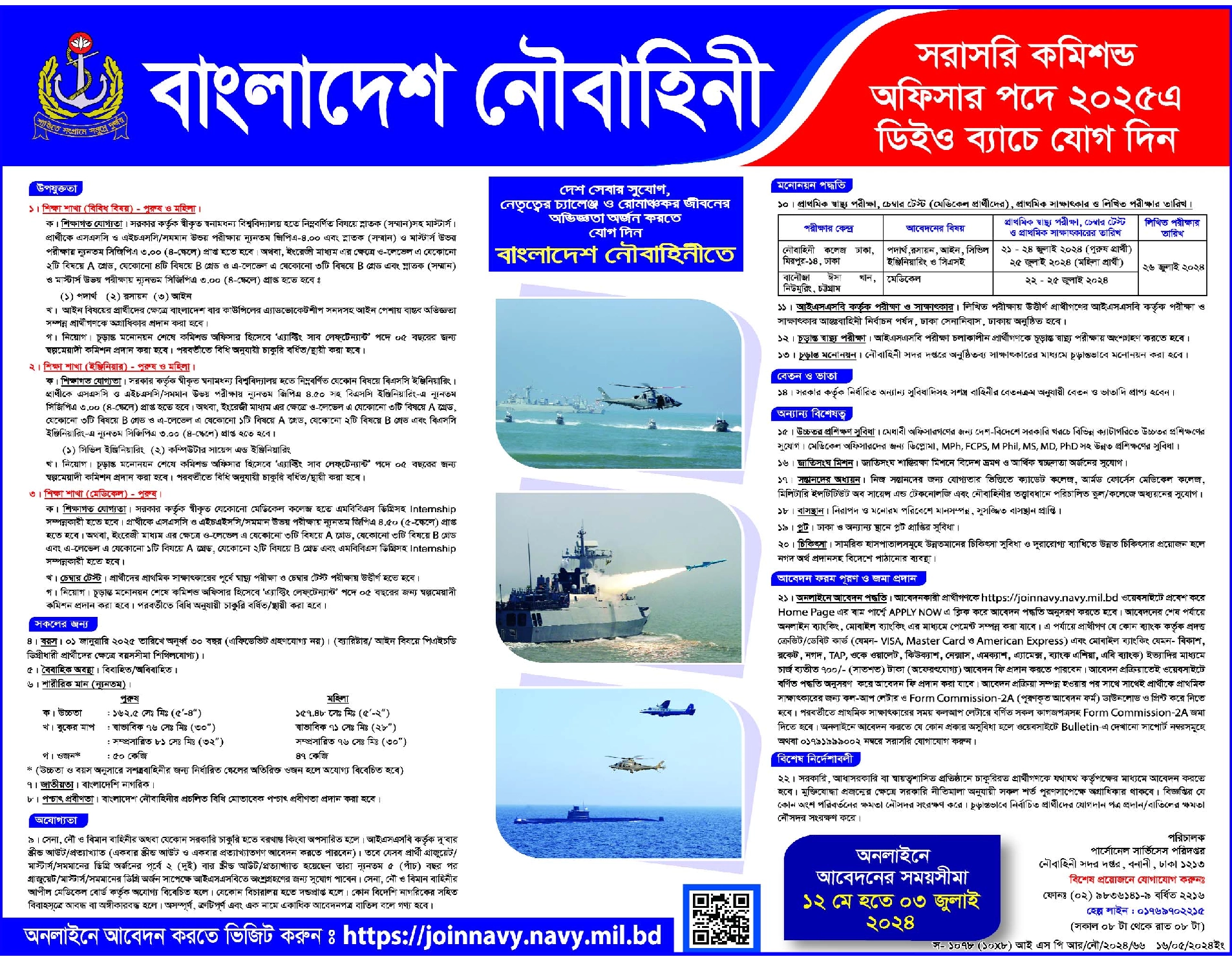Bangladesh Navy
বাংলাদেশ নৌবাহিনী
Job Category: Govt. Job
Job Source: দৈনিক ইত্তেফাক
Posted On: 17 May 2024
Application Deadline:3 Jul 2024

Apply
Welcome to our website bangladeshtodays.org. This is the best website online. Here you will get daily updates on all types of job news such as: E.g Job Vacancies in Public Sector, Private Sector, Corporate, Banking, NGO Jobs etc. You can select any type of job from the category option in the top menu of the website. You can apply for jobs directly on our website. There is a search option at the top of this website where you can search for jobs according to your requirements. If you have benefited even in the slightest from our website, then you can tell your friends, family and everyone else about this website. I hope you also benefit from this website. You can share this website post on Facebook, Instagram, Twitter or any other online platform if you want. Many people can benefit from your sharing. And if there is anything you want to know or understand, you can contact us by email on the contact page of this website. We will try our best to help you, thank you very much.
## Bangladesh Navy: Guardians of the Maritime Frontiers
### Introduction
The Bangladesh Navy, an integral component of the nation’s armed forces, stands as the guardian of Bangladesh’s maritime sovereignty. With a rich history rooted in the country’s struggle for independence, the Bangladesh Navy has evolved into a formidable force dedicated to protecting national interests, ensuring maritime security, and contributing to regional stability. This essay provides an in-depth exploration of the Bangladesh Navy, covering its historical background, organizational structure, core functions, achievements, challenges, and future directions.
### Historical Background
#### Formation and Liberation War
The Bangladesh Navy was established on March 26, 1971, amid the Bangladesh Liberation War. Initially, the Navy faced significant challenges, including a lack of vessels, trained personnel, and infrastructure. Despite these constraints, the early pioneers of the Navy demonstrated exceptional bravery and resilience. The Mukti Bahini, or liberation forces, played a crucial role in guerrilla warfare against the Pakistan Navy, disrupting enemy supply lines and conducting coastal operations.
#### Post-Independence Reconstruction
Following the victory and independence of Bangladesh in December 1971, the Navy began a gradual process of reconstruction and modernization. The acquisition of new vessels, the training of personnel, and the establishment of naval bases marked the initial steps toward building a robust naval force. Over the decades, the Bangladesh Navy has grown significantly, transforming from a modest fleet into a modern maritime force capable of addressing a wide range of security challenges.
### Organizational Structure
The Bangladesh Navy operates under the Ministry of Defence and is structured to efficiently manage its diverse responsibilities. The organizational structure includes the Chief of Naval Staff, various commands, directorates, and specialized units.
#### Chief of Naval Staff
The Chief of Naval Staff (CNS) is the highest-ranking officer in the Bangladesh Navy, responsible for overall strategic leadership and direction. The CNS reports directly to the Prime Minister and the Ministry of Defence, ensuring that the Navy’s operations align with national defense policies and objectives.
#### Commands
The Navy is divided into several commands, each responsible for specific geographical areas and operational functions:
– **Naval Headquarters (NHQ)**: Located in Dhaka, NHQ serves as the central administrative and command center of the Navy.
– **Eastern Naval Command (ENC)**: Based in Chittagong, ENC oversees operations along the eastern maritime frontier and the Bay of Bengal.
– **Western Naval Command (WNC)**: Based in Khulna, WNC manages operations along the western maritime regions and inland waterways.
#### Directorates and Units
The Bangladesh Navy comprises various directorates and specialized units that focus on different aspects of naval operations and support. Key directorates and units include:
– **Operations Directorate**: Responsible for planning and executing naval operations, including patrols, surveillance, and defense missions.
– **Logistics Directorate**: Manages logistics, supply chain, and maintenance of naval assets and infrastructure.
– **Naval Aviation**: Operates naval aircraft and helicopters for reconnaissance, anti-submarine warfare, and search-and-rescue missions.
– **Special Warfare Diving and Salvage (SWADS)**: A specialized unit trained for special operations, including underwater demolition, salvage, and counter-terrorism.
### Core Functions of the Bangladesh Navy
The Bangladesh Navy performs a wide range of functions aimed at ensuring maritime security, sovereignty, and stability. These functions can be broadly categorized into defense, maritime law enforcement, humanitarian assistance, and international cooperation.
#### Defense and Security
One of the primary functions of the Bangladesh Navy is to defend the country’s maritime interests and ensure national security. This includes:
– **Territorial Defense**: Protecting the country’s maritime boundaries and territorial waters from external threats and aggression.
– **Maritime Surveillance**: Conducting continuous surveillance and patrolling of the Exclusive Economic Zone (EEZ) and territorial waters to detect and deter illegal activities.
– **Fleet Operations**: Maintaining a combat-ready fleet capable of executing a wide range of naval operations, including surface warfare, anti-submarine warfare, and amphibious operations.
#### Maritime Law Enforcement
The Bangladesh Navy plays a crucial role in enforcing maritime law and ensuring the security of the country’s maritime domain. Key activities include:
– **Anti-Piracy Operations**: Conducting patrols and operations to combat piracy and armed robbery at sea.
– **Fisheries Protection**: Enforcing regulations to prevent illegal, unreported, and unregulated (IUU) fishing within the EEZ.
– **Counter-Narcotics**: Interdicting and preventing the smuggling of narcotics and other illegal substances through maritime routes.
#### Humanitarian Assistance and Disaster Relief
The Bangladesh Navy is actively involved in humanitarian assistance and disaster relief (HADR) operations, providing critical support during natural disasters and emergencies. Key activities include:
– **Search and Rescue**: Conducting search and rescue missions to save lives and assist vessels in distress.
– **Disaster Response**: Providing immediate relief and assistance during natural disasters, such as cyclones, floods, and tsunamis.
– **Medical Assistance**: Offering medical aid and services to affected populations during emergencies and humanitarian crises.
#### International Cooperation
The Bangladesh Navy engages in international cooperation to promote regional stability and enhance maritime security. Key activities include:
– **Joint Exercises**: Participating in joint naval exercises and training programs with other countries to improve interoperability and operational readiness.
– **Peacekeeping Operations**: Contributing naval personnel and resources to United Nations (UN) peacekeeping missions and humanitarian operations.
– **Diplomatic Engagements**: Engaging in naval diplomacy through port visits, goodwill missions, and participation in international maritime forums.
### Achievements of the Bangladesh Navy
Over the years, the Bangladesh Navy has made significant strides in enhancing its capabilities and contributions to national and regional security. Some of the key achievements include:
#### Modernization and Expansion
The Bangladesh Navy has undergone significant modernization and expansion, acquiring new vessels, aircraft, and advanced technologies. Key achievements include:
– **Fleet Expansion**: The acquisition of new ships, submarines, and patrol vessels has expanded the Navy’s operational capabilities and reach.
– **Naval Aviation**: The establishment of a naval aviation wing with modern aircraft and helicopters has enhanced the Navy’s reconnaissance, surveillance, and anti-submarine warfare capabilities.
– **Base Development**: The construction and upgrading of naval bases and facilities have improved the Navy’s logistical and operational support infrastructure.
#### Enhanced Operational Capabilities
The Bangladesh Navy has enhanced its operational capabilities through continuous training, joint exercises, and strategic initiatives. Key achievements include:
– **Joint Exercises**: Participation in joint exercises with international navies, such as the United States, India, and China, has improved the Navy’s interoperability and operational readiness.
– **Specialized Units**: The establishment of specialized units, such as SWADS, has strengthened the Navy’s capabilities in special operations and counter-terrorism.
– **Technological Advancements**: The adoption of advanced technologies, such as radar systems, communication equipment, and surveillance drones, has improved the Navy’s situational awareness and operational efficiency.
#### Contributions to Maritime Security
The Bangladesh Navy has made significant contributions to maritime security, both nationally and regionally. Key achievements include:
– **Anti-Piracy Operations**: Successful anti-piracy operations have contributed to the security of maritime trade routes and the safety of mariners.
– **Fisheries Protection**: Effective enforcement of fisheries regulations has helped conserve marine resources and prevent illegal fishing activities.
– **Regional Cooperation**: Active participation in regional maritime security initiatives, such as the Indian Ocean Naval Symposium (IONS) and the Western Pacific Naval Symposium (WPNS), has strengthened regional cooperation and stability.
#### Humanitarian Assistance and Disaster Relief
The Bangladesh Navy has demonstrated its commitment to humanitarian assistance and disaster relief, providing critical support during emergencies. Key achievements include:
– **Cyclone Relief**: The Navy’s timely response and assistance during cyclones, such as Cyclone Sidr and Cyclone Amphan, have saved lives and provided essential relief to affected communities.
– **Search and Rescue Missions**: Successful search and rescue missions have saved numerous lives and assisted vessels in distress.
– **Medical Aid**: The provision of medical assistance during emergencies and humanitarian crises has alleviated suffering and supported public health efforts.
### Challenges Faced by the Bangladesh Navy
Despite its achievements, the Bangladesh Navy faces several challenges in fulfilling its mandate. These challenges include:
#### Resource Constraints
Limited financial and material resources can hinder the Navy’s ability to effectively carry out its functions. Insufficient funding can impact the acquisition of new vessels, maintenance of existing assets, and implementation of training programs.
#### Technological Advancements
Keeping pace with rapid technological advancements in naval warfare and maritime security is a significant challenge. The Navy must continuously upgrade its technologies and capabilities to stay ahead of potential threats and adversaries.
#### Maritime Security Threats
The dynamic and evolving nature of maritime security threats, such as piracy, smuggling, and terrorism, requires constant vigilance and adaptation. The Navy must be prepared to respond to diverse and unpredictable challenges in the maritime domain.
#### Regional Geopolitics
The complex geopolitical landscape of the Bay of Bengal and the Indian Ocean region presents challenges for the Bangladesh Navy. Navigating regional tensions and maintaining a balance of power requires strategic planning and diplomatic engagement.
#### Environmental Challenges
The Navy must address environmental challenges, such as climate change and marine pollution, which can impact naval operations and maritime security. Ensuring the sustainability of marine resources and protecting the marine environment are critical priorities.
### Future Directions and Reforms
To address these challenges and enhance its effectiveness, the Bangladesh Navy can consider several reforms and future directions:
#### Strengthening Resource Allocation
Ensuring adequate financial and material resources is essential for the effective functioning of the Navy. This includes increased budgetary allocations, strategic investments, and efficient resource management.
#### Enhancing Technological Capabilities
Investing in advanced technologies and capabilities is crucial for maintaining the Navy’s operational edge. This includes the acquisition of modern vessels, aircraft, and surveillance systems, as well as the development of cyber and electronic warfare capabilities.

